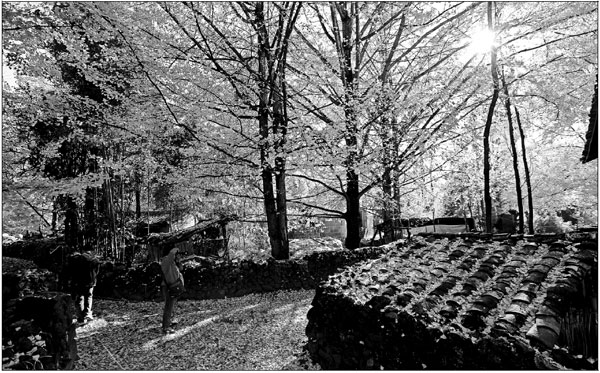Ginkgo paradise


With 30,000 trees, Jiangdong village in Yunnan looks like a golden-hued forest in autumn.
The Jiangdong village, surrounded by more than 30,000 ginkgo trees, including several dozen older than 500 years, turns golden-toned toward the end of each year.
The beautiful scenery attract thousands of tourists to the village, which is 40 kilometers from Tengchong city, in western Yunnan province.
Seen from afar, the village looks like a vast ginkgo forest.
The villagers' homes, built in traditional style and enclosed by low and black walls built using the local lava rocks, are scattered along narrow lanes.
Tall ginkgo trees cover the courtyards, with their yellow leaves lying on the ground as well as on the roofs during autumn.
In the old days, every newlywed couple in the village would plant a ginkgo tree, known for its extremely slow growth, in their courtyard or field.
The tree was expected to bear fruit when the couple got old, so they would be able to support themselves by selling the nuts.
Ginkgo trees that can bear nuts are customarily handed down as family assets in the village.
In recent years, the village has seen tremendous transformation thanks to the development of eco-tourism built around the ginkgo trees.
The village used to be secluded and poor, but its beauty was discovered by a bunch of local professional photographers.
To boost tourism, the local government implemented a comprehensive project to enhance the village environment and infrastructure in 2008 to allow it to host visitors.
Before that, the villagers did not have proper water supply, power and roads.
Separately, the local government also encouraged villagers to open restaurants and inns to accommodate tourists and provided funding to help them upgrade their homes.
Yang Zhuying, 52, was among the earliest in the village to open an agri-tainment venture - a rural inn and restaurant.
She started the business in 2008, and manages it with her husband.
Their children also help during the busiest season, when they can receive as many as 200 diners per day.
Her family of five earn about 140,000 yuan ($20,167) from the business annually.
"The venture has become the main income source for our family," says Yang, who also sells local specialties, such as ginkgo nuts, to visiting tourists.

































